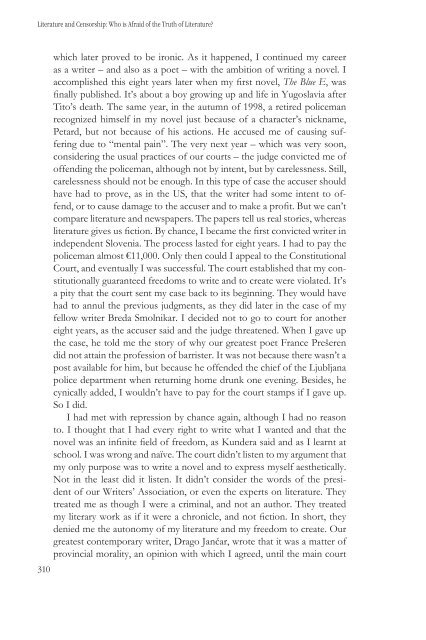Literatura in cenzura - Društvo za primerjalno književnost - ZRC SAZU
Literatura in cenzura - Društvo za primerjalno književnost - ZRC SAZU
Literatura in cenzura - Društvo za primerjalno književnost - ZRC SAZU
- No tags were found...
Create successful ePaper yourself
Turn your PDF publications into a flip-book with our unique Google optimized e-Paper software.
Literature and Censorship: Who is Afraid of the Truth of Literature?310which later proved to be ironic. As it happened, I cont<strong>in</strong>ued my careeras a writer – and also as a poet – with the ambition of writ<strong>in</strong>g a novel. Iaccomplished this eight years later when my first novel, The Blue E, wasf<strong>in</strong>ally published. It’s about a boy grow<strong>in</strong>g up and life <strong>in</strong> Yugoslavia afterTito’s death. The same year, <strong>in</strong> the autumn of 1998, a retired policemanrecognized himself <strong>in</strong> my novel just because of a character’s nickname,Petard, but not because of his actions. He accused me of caus<strong>in</strong>g suffer<strong>in</strong>gdue to “mental pa<strong>in</strong>”. The very next year – which was very soon,consider<strong>in</strong>g the usual practices of our courts – the judge convicted me ofoffend<strong>in</strong>g the policeman, although not by <strong>in</strong>tent, but by carelessness. Still,carelessness should not be enough. In this type of case the accuser shouldhave had to prove, as <strong>in</strong> the US, that the writer had some <strong>in</strong>tent to offend,or to cause damage to the accuser and to make a profit. But we can’tcompare literature and newspapers. The papers tell us real stories, whereasliterature gives us fiction. By chance, I became the first convicted writer <strong>in</strong><strong>in</strong>dependent Slovenia. The process lasted for eight years. I had to pay thepoliceman almost €11,000. Only then could I appeal to the ConstitutionalCourt, and eventually I was successful. The court established that my constitutionallyguaranteed freedoms to write and to create were violated. It’sa pity that the court sent my case back to its beg<strong>in</strong>n<strong>in</strong>g. They would havehad to annul the previous judgments, as they did later <strong>in</strong> the case of myfellow writer Breda Smolnikar. I decided not to go to court for anothereight years, as the accuser said and the judge threatened. When I gave upthe case, he told me the story of why our greatest poet France Prešerendid not atta<strong>in</strong> the profession of barrister. It was not because there wasn’t apost available for him, but because he offended the chief of the Ljubljanapolice department when return<strong>in</strong>g home drunk one even<strong>in</strong>g. Besides, hecynically added, I wouldn’t have to pay for the court stamps if I gave up.So I did.I had met with repression by chance aga<strong>in</strong>, although I had no reasonto. I thought that I had every right to write what I wanted and that thenovel was an <strong>in</strong>f<strong>in</strong>ite field of freedom, as Kundera said and as I learnt atschool. I was wrong and naïve. The court didn’t listen to my argument thatmy only purpose was to write a novel and to express myself aesthetically.Not <strong>in</strong> the least did it listen. It didn’t consider the words of the presidentof our Writers’ Association, or even the experts on literature. Theytreated me as though I were a crim<strong>in</strong>al, and not an author. They treatedmy literary work as if it were a chronicle, and not fiction. In short, theydenied me the autonomy of my literature and my freedom to create. Ourgreatest contemporary writer, Drago Jančar, wrote that it was a matter ofprov<strong>in</strong>cial morality, an op<strong>in</strong>ion with which I agreed, until the ma<strong>in</strong> court
















